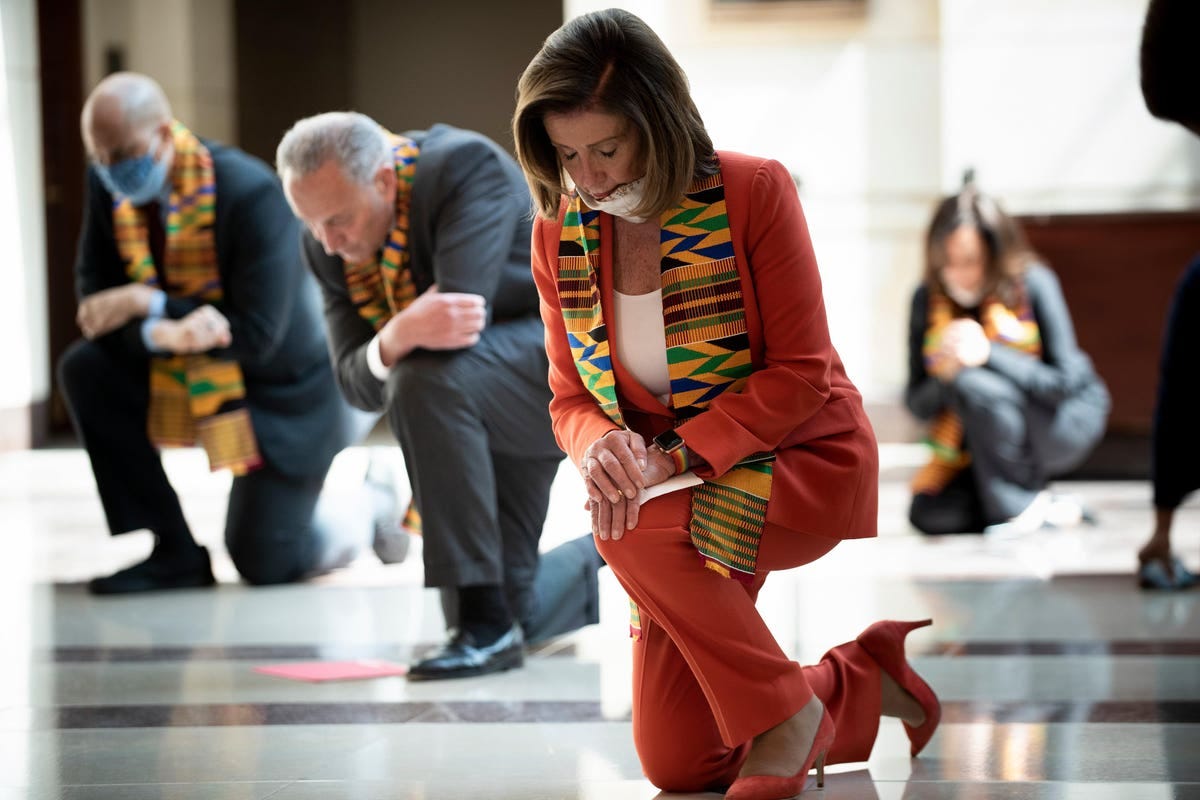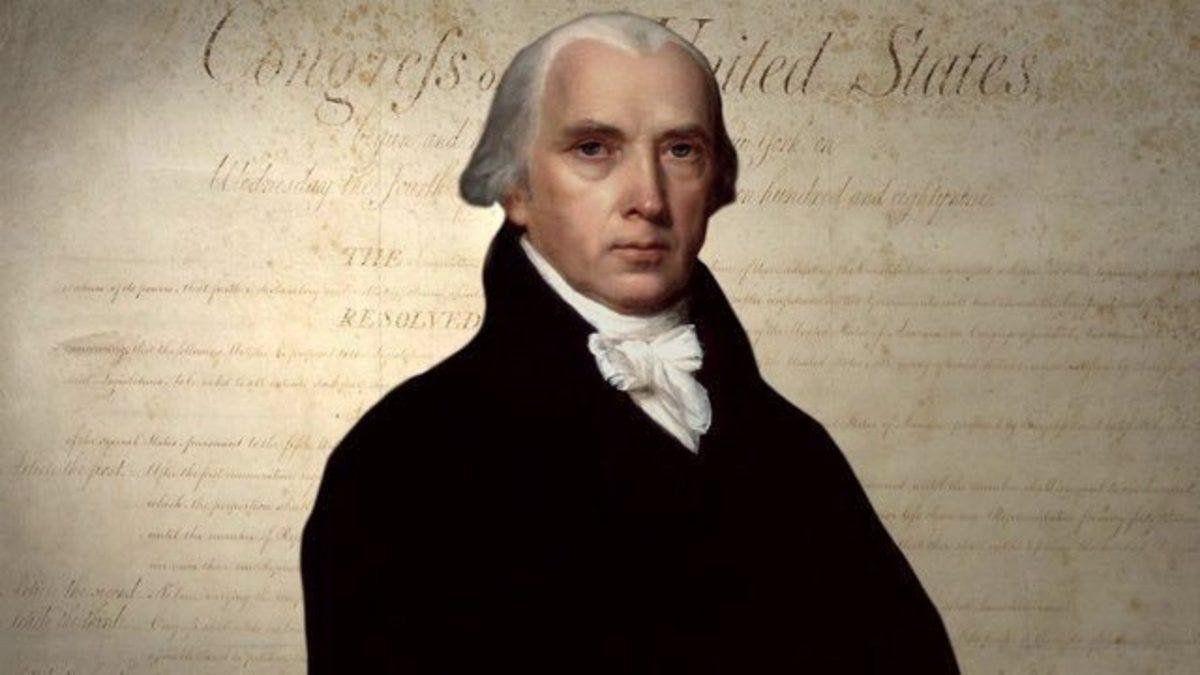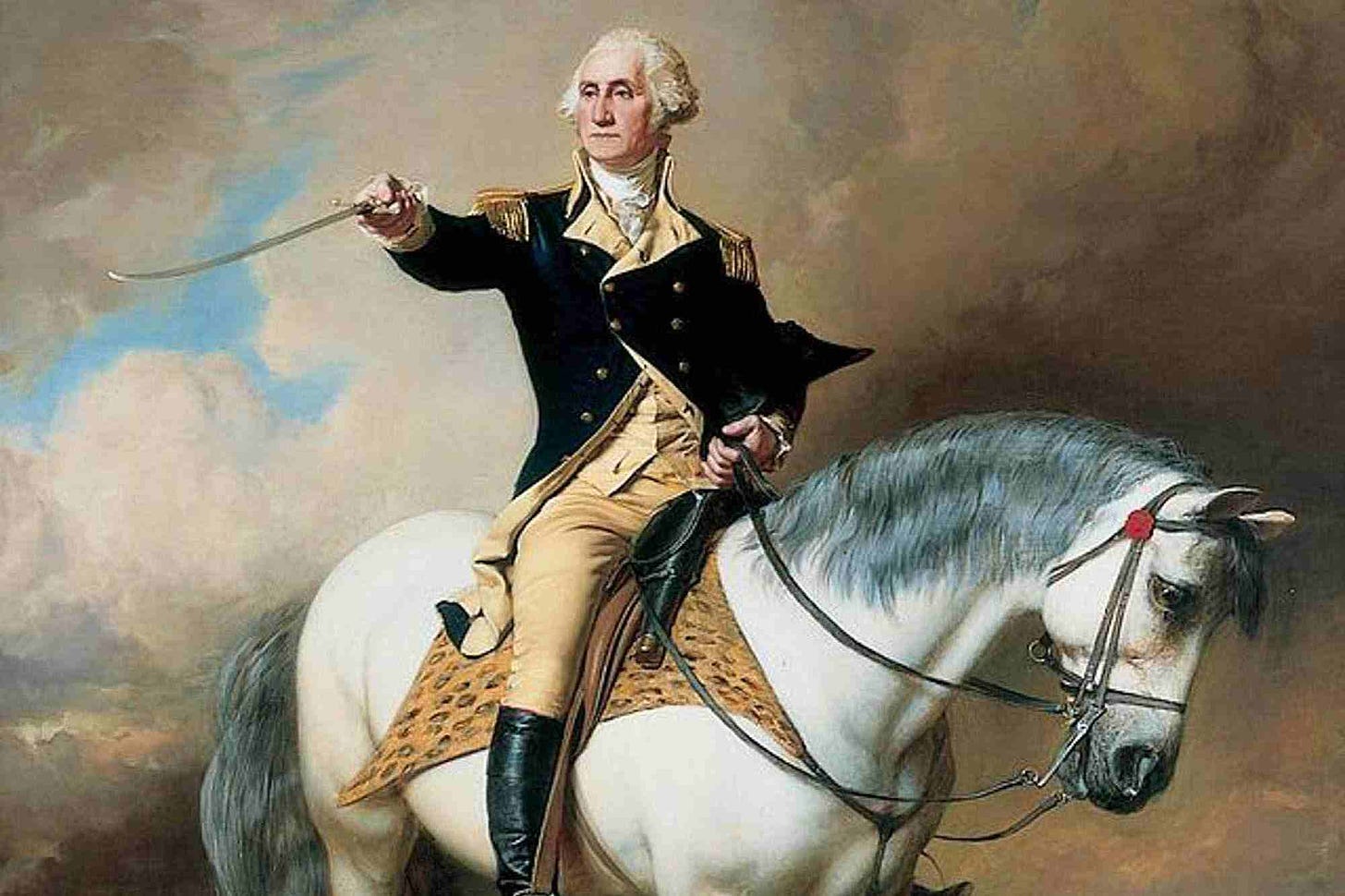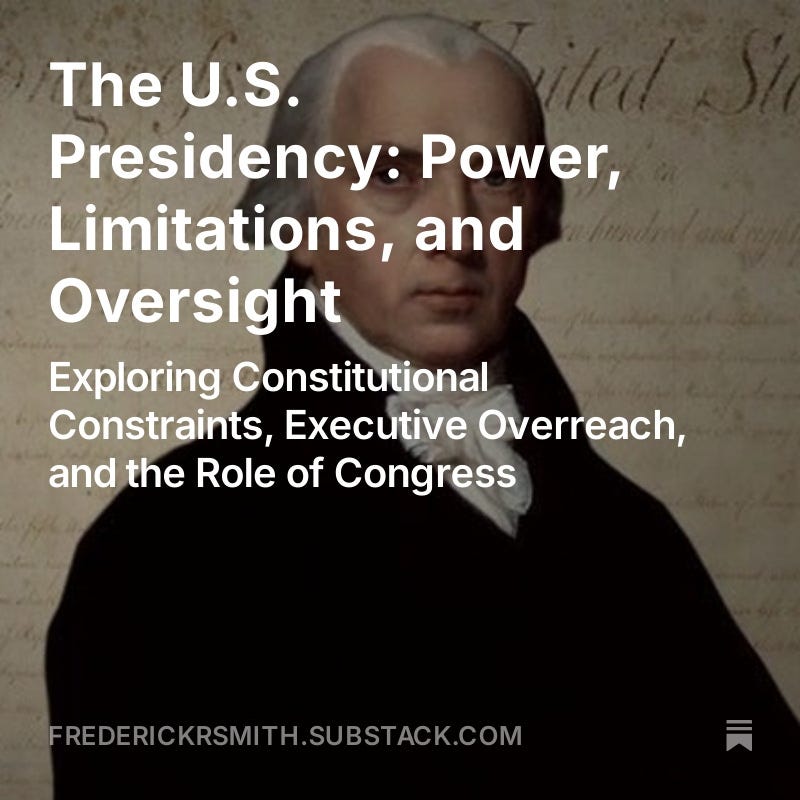The U.S. Presidency: Power, Limitations, and Oversight
Exploring Constitutional Constraints, Executive Overreach, and the Role of Congress
In order to lay a due foundation for that separate and distinct exercise of the different powers of government, which to a certain extent is admitted on all hands to be essential to the preservation of liberty, it is evident that each department should have a will of its own; and consequently should be so constituted that the members of each should have as little agency as possible in the appointment of the members of the others. Were this principle rigorously adhered to, it would require that all the appointments for the supreme executive, legislative, and judiciary magistracies should be drawn from the same fountain of authority, the people, through channels having no communication whatever with one another.
James Madison, Federalist 51
Words 3,268 | Read Time 15 min | Enjoy
Opening Salvo
Of all the dispositions and habits which lead to political prosperity, religion and morality are indispensable supports. In vain would that man claim the tribute of patriotism who should labor to subvert these great pillars of human happiness, these firmest props of the duties of men and citizens. The mere politician, equally with the pious man, ought to respect and to cherish them. A volume could not trace all their connections with private and public felicity. Let it simply be asked where is the security for property, for reputation, for life, if the sense of religious obligation desert the oaths, which are the instruments of investigation in courts of justice? And let us with caution indulge the supposition that morality can be maintained without religion. Whatever may be conceded to the influence of refined education on minds of peculiar structure, reason and experience both forbid us to expect that national morality can prevail in exclusion of religious principle.
George Washington - Farewell Address, September 19, 1796
Introduction
The U.S. President is powerful and influential. But a series of limits restricts the office. They aim to balance power within the federal government. These constraints come from historical documents, the United States Constitution, and early leaders’ precedents. This essay examines these limits. It uses the Federalist Papers, the Constitution’s separation of powers, George Washington’s example, and some abuses of presidential power.
The Federalist Papers and Presidential Limits
The Federalist Papers are 85 essays by Hamilton, Madison, and Jay. They helped ratify the U.S. Constitution. These essays offer key insights into the Framers’ views on limiting presidential power. Hamilton wrote Federalist 69, comparing the President’s powers to those of the British monarch and the Governor of New York. Hamilton notes that the Constitution limits the President’s powers. That is especially true for military command, treaty-making, and appointing officers. This distinction highlights a limit on executive power. It aims to prevent tyranny.
Federalist No. 51, penned by Madison, elaborates on the federal government’s need for checks and balances. It articulates the principle that each branch of government must be able to resist encroachments by the others. This framework is vital. It limits the President’s power. It ensures the executive branch does not dominate the legislative and judicial branches. The Federalist Papers thus highlight a key design. It is to limit presidential overreach through a system of interlocking and overlapping powers.
The Constitution’s Separation of Powers
The U.S. Constitution divides power among the legislative, executive, and judicial branches. It prevents any one entity from becoming too powerful. Article II of the Constitution outlines the President’s powers and duties. Yet, the powers granted to Congress and the judiciary limit it.
For example, only Congress can control the budget. That limits the President’s power over national finances. The President is the armed forces Commander in Chief. But, only Congress can declare war and fund military operations. Also, the President’s treaty power needs Senate approval. Ratification requires a two-thirds majority.
Judicial review, established by the landmark case Marbury v. Madison in 1803, empowers the judiciary to invalidate unconstitutional presidential actions. This power is a vital check on the executive. It ensures that presidential directives conform to the Constitution.
George Washington’s Positive Example
George Washington, the first U.S. President, set a precedent for principled, restrained leadership. Washington knew the dangers of executive overreach. He sought to set norms to guide future Presidents. After two terms, he gave up power. That sets a tradition of peaceful transitions and limited tenures. The 22nd Amendment later made it official.
Washington’s Farewell Address stressed unity. It warned of factionalism and foreign entanglements. Washington prioritized the republic’s long-term stability over short-term political gains. He showed self-restraint and respect for the Constitution. These would become the standard for presidential conduct.
Towards the preservation of your government and the permanency of your present happy state, it is requisite not only that you steadily discount nance irregular oppositions to its acknowledged authority but also that you resist with care the spirit of innovation upon its principles, however specious the pretexts. One method of assault may be to effect in the forms of the Constitution alterations which will impair the energy of the system and thus to undermine what cannot be directly overthrown. In all the changes to which you may be invited, remember that time and habit are at least as necessary to fix the true character of governments as of other human institutions, that experience is the surest standard by which to test the real tendency of the existing constitution of a country, that facility in changes upon the credit of mere hypotheses and opinion exposes to perpetual change from the endless variety of hypotheses and opinion; and remember, especially, that for the efficient manage ment of your common interests in a country so extensive as ours, a government of as much vigor as is consistent with the perfect security of liberty is in dispensable; liberty itself will find in such a governement, with powers properly distributed and adjusted, its surest guardian. It is indeed little else than a name, where the government is too feeble to withstand the enterprises of faction, to confine each member of the society within the limits prescribed by the laws, and to maintain all in the secure and tranquil enjoyment of the rights of person and property.
George Washington - Farwell Address, September 19, 1796
Examples of Abuses of Presidential Power
Some critics have accused certain presidents of overstepping their constitutional limits. One common area of contention is the use of executive orders. Executive orders are a valid tool for managing the executive branch. Yet, their use can blur the line between executive action and legislative authority.
For example, FDR’s Executive Order 9066 is an abuse of power. It authorized the internment of Japanese Americans during WWII. The order violated the civil liberties of thousands of Americans. It bypassed legislative debate and due process.
One event cited as an abuse of executive order by Ronald Reagan is Executive Order 12333, issued in December 1981. This order expanded U.S. intelligence agencies’ powers, especially the CIA. It allowed them to conduct surveillance and intelligence-gathering operations at home and abroad.
More recently, the use of executive orders has continued to spark controversy. Some criticized President Obama’s immigration actions, like DACA, as overreach.
These examples, just a few of hundreds, show tension. It is between the need for swift executive action and maintaining constitutional checks and balances.
The Antiquities Act
The 1906 Antiquities Act is a landmark U.S. law. It gives the President the power to name national monuments on federal lands. The Act aims to protect important natural, cultural, or scientific features. Enacted on June 8, 1906, the Act aimed to stop the looting of Native American archaeological sites and other cultural resources. Its main purpose is to protect historic landmarks and objects of interest.
The Act empowers the President to make swift national monument declarations. That bypasses the often lengthy legislative process. This process empowers abuse, such as the designations that cover the smallest area to protect the objects. The Act punishes unauthorized digging, harming, or destroying antiquities on federal lands. Violators face fines and imprisonment.
President Theodore Roosevelt was the first to use the Act. He designated Devil’s Tower in Wyoming as the first national monument in September 1906. Over the years, the Act has “protected” many sites. These include archaeological treasures, natural landscapes, and marine environments. The Act’s focus on conserving all environments, including the sea, seems inspiring but fraught with abuse. This presidential power has sometimes caused controversy. It concerns the size of protected areas and their impact on local economies.
Notable examples include designating the Grand Canyon National Monument in 1908. It later became a national park. In 1924, they designated the Statue of Liberty National Monument as another. The Act has recently created large marine conservation areas. These include the Papahānaumokuākea Marine National Monument, established in 2006.
Clinton designated 19 national monuments while in office. It included Utah’s Grand Staircase-Escalante National Monument, which protected 1.9 million acres. These designations often withdrew these lands from new mining and drilling. The narrative: “protect natural and cultural resources.” Bull snot - it is all about power and control.
Reflection
Using executive orders and acts like the Antiquities Act has long been a contentious issue in American governance. It highlights the balance between decisive executive action and constitutional checks and balances. Presidents react to emergencies with swift responses. But their use often sparks debates over executive authority limits. Examples are Franklin D. Roosevelt’s Executive Order 9066 and Ronald Reagan’s Executive Order 12333. They raised concerns about executive overreach.
These concerns extend beyond the executive branch, as Congress also plays a critical role in this dynamic. Congress is the body that sets fiscal policies and oversees spending. It drains resources, exacerbating the issue with reckless spending. This issue isn’t a one-party problem. Both have approved costly presidential projects with little debate. This bipartisan failure to oversee allows unchecked spending. It expands federal powers and erodes the separation of powers in the Constitution.
Also, the lack of fiscal discipline and support for costly executive initiatives has driven inflation. When the government overspends, it often borrows or prints money, the prime driver of inflation. The increased money supply reduces the currency’s value. It drives up prices and cuts the purchasing power of ordinary citizens. This cycle of spending and inflation affects the wider economy. It impacts everything from consumer goods to housing and healthcare.
The Antiquities Act is a vital conservation tool. But it shows the complexities of executive power. The Act allows Presidents to name national monuments. It often bypasses the legislative process to “protect” valuable cultural and natural resources. Banning large areas, like those for mining or drilling, can provoke local opposition. The controversy over the Antiquities Act shows a tension. It is a conflict between federal authority and local interests. Congress is missing in action.
Warp Speed and Burnt Hot Dogs
On August 29, 2024, Republican nominee former President Donald Trump said that if elected in November, he would make in-vitro fertilization (IVF) free for “all Americans that get it.” His administration would “be paying for that treatment,” he said. “Or we’re going to be mandating that the insurance company pay.” “President Trump’s proposal would be a game changer for LGBT couples who want to start families of their own,” states the homosexual Log Cabin Republicans. To add insult to injury, Melania Trump is helping the Log Cabins in their lobbying money-harvesting quest. The federal price tag for Trump’s proposal is $7 billion. While IVF is a procedure most often used by couples who experience difficulties in achieving pregnancy by normal means, the use of IVF to produce more offspring for homosexuals is another intended effect.1 In the same interview, Trump reiterated his criticism of Florida’s pro-life law.
Given the above, sorry Trump advocates, I must hold my nose to vote for the “Big T,” the Warp Speed mRNA promoter. Why do candidates on both crummy sides (one is more crummy than the other - that is, the commie side) promise to spend money on any particular issue? Do they not understand the difference between the executive and congressional branches that are supposed to allocate money?
My dear Trump aficionado friends, I must be honest with myself. I hold our Constitution in the highest regard, regardless of which “side.” For example, the nasty neo-con notion that we have to “crack an egg to make an omelet” gives me gas pains. Does not matter which side is “in” (which is fake anyway); I will always look to the cogent realization of the Constitution. For example, as I have said on many occasions, if the J6 event happened to be a left-wing thing, I would advocate for the Bill of Rights to protect those charged. Nevertheless, we know the kid glove treatment bestowed on the left-wing St. Floyd riot mob members. Back then, a bigger glove, the latex variety, was inserted into the consciousness of cogent-minded people via the position where the sun does not illuminate. That is - when the detestable puss-oozing progressive Congress musty “members” bent their knees to that acidic and satanic social (in)justice s-show.

Meanwhile, the mere fact the Biden administration rallied to have the J6 defendants placed in solitary confinement is akin to a left-handed blow torch aimed at the Constitution. Again, to be consistent, the Iran-Contra affair was a right punch to the Constitution.
I will continue to say it does not matter who gets in this 2024 clown show election. Both crummy sides have made the 35 trillion debt that will cause a crash, making the 29 Depression seem like a Sunday school picnic. This dopey debt is caused by the abuse of power, at worst, or at least the wearing of dunce hats for not understanding the Constitution. Our country is overdone, just like the burnt hot dogs on my grill spewing carbon from my backyard gas grill. Soon, we will have to spew even more carbon, which, in an odd coincidence, will help plant life. The only energy left will be the logs cut from trees in the backyard to stay warm during the upcoming warp-speed crash. Get it? The morbid green vomit mandates that RFK Jr. seems to align with will cause more carbon emissions due to a crash caused by the mounting debt to fuel the crummy-dopey pogroms to reduce our stupid carbon footprint.2
The Reincarnated Illuminati (R.I.) running this stupid s-show, the illusion we live under, are laughing at us. These intellectual giants with pea brains think we are bugs ready to be squashed as mandated in their bubble-head bible: Georgia Guidestones.34 Have you heard anything from anybody in the “mainstream” about the upcoming crash? If you do, please let me know. To illustrate how dumbed-down society is, consider the 100 percent increase in many food items, but we are “told” that inflation is in the single digits. And to add salt to the wound, we get the bubble head blabber that inflation is “declining.” Inflation, the hidden tax, would not exist if we had real money - period. We cogent-minded folk know it is a declining game to get the dumbed-down dunces to “vote” for Kamalaism. Only Republicans cheat in elections, you know. The Deamon-craps are as pure as WHITE snow.
Meanwhile, the R.I. are building their bunkers to be cozy during the crash. And let’s not forget about the government bunkers for our lousy leaders to enjoy. But, in time, they will have to come out to resupply and face the music they made. They will face the Mad Max tribes to get some remaining crumbs. But before that occurs, here is the good news: without the internet to keep them entertained, they will go insane. Deservedly so. I can’t think of a science fiction plot that fits this scenario. If there is, please let me know.
We are overdone, just like the burnt hot dogs on my grill spewing carbon from my backyard gas grill. Soon, we will have to spew even more carbon, which, in an odd coincidence, will help plant life. The only energy left will be the logs cut from trees in the backyard to stay warm during the upcoming warp-speed crash. Get it? The morbid green mandates that RFK Jr. seems to align with will cause more carbon emissions due to a crash caused by the mounting debt to fuel the crummy-dopey pogroms to reduce our stupid carbon footprint.
Fred Smith
Conclusion
The Federalist Papers and the Constitution limit presidential power. They aim to prevent tyranny. The Framers intended this with their system of checks and balances. The essays by Hamilton, Madison, and Jay compare the President’s powers to a monarch’s. They stress the need for checks between branches. They establish a foundation for an executive that must abide by the law and be accountable to the other branches.
This plan has faced rigorous challenges over the years, withstanding scrutiny. We’ve had some shining moments of restraint but copious abuses. FDR thought internment camps were a neat idea. Reagan gave the CIA a blank check to spy on everyone. Executive orders and the Antiquities Act are quite the thing. Let’s not forget about Trump’s cozy Warp Speed relationship with the mRNA pushers. These are perfect tools for bypassing that pesky Congress whenever a president feels like playing King for a Day. They remind us that “decisive leadership” can lead to overreach.
The Constitution aims to keep a balance. Yet, we drown in debt. Politicians, unconcerned with fiscal or constitutional limits, make ludicrous promises. But, as long as presidents pretend to follow the Federalist Papers, we can proceed with the illusion. As the Framers intended, we can pretend the executive branch is still accountable and limited. How reassuring.
Special Announcement
Your author is working on a special book-length essay about Washington’s Farewell Address. We will explore each of the 27 paragraphs in his address in several essays. A modern text version will compare to today’s reality. Please stay tuned for this special and exclusive Frederick R. Smith Speaks offering. DUTY and HONOR!
Parting Shot
Anti-Woke Closing
Play it often; play it loud. Irriate the Willfully Overlooking Known Evil (WOKE) ecosystem. 📕
I warmly encourage you to consider becoming a paid subscriber if you have the means. Tips are appreciated, too. Regardless of your choice, your support is deeply appreciated. From the bottom of my heart, thank you for your invaluable support!
IVF involves the selection of embryos, often based on sex or genetic characteristics, which can destroy embryos that do not survive or are discarded. Last year, nearly two million embryos were lost due to this process. It is morally wrong to compel individuals to participate in or finance practices that violate their religious beliefs and ethical principles. Eugenics, historically linked to the Nazis and other totalitarian regimes, aimed to “enhance” the human condition through genetic manipulation and selective breeding, with the Nazis infamously pursuing the creation of a so-called “master race.”
Kennedy’s stance against mRNA is good, however. Also, check out The RFK Jr. Interview They Don’t Want You to See.
With pea brains, maybe there is something to the shape-shifting reptilian theory.












Personally, I suspect the Articles of Confederation should have been retained instead of a centralized govt created by the Constitution - which has been corrupted by evil men, as ole Ben Franklin warned
Another authoritative essay on our history Frederick. Thank you. How sad how we have fallen so far from the mark.